As from :- c/o Mr. H. M. Conway
Box 303,
WELLINGTON.
December 1946.
My dear Prayer-Partners,
I find that the two previous letters mentioned in my November one have never reached you, so I now reproduce them as written, except for minor alterations.
Written, from Weihsien Internment Camp, September, 1944.
My dear Prayer-Partners,
What a long, time it is since I was able to write you a normal letter! I'm not sure just how long. I am not even yet in a position to post such a letter, but I am writing this in the faith that before long we shall be free to post uncensored mail. Such news as comes to us suggests that, in Europe at any rate, the conflict may soon end, and we hope that, with a not-too-large interval, there may also be peace here in the East. And then..? We know not just what will happen to us - whether we shall return to Chefoo, or remove elsewhere in China, or whether we may be able to come home on furlough. We leave it to the Lord to plan for us and will be happy whatever He arranges, although we shall rejoice when the time comes for us to come to New Zealand to see you all - four of us for the first time!
I sent you a 25-word Red Cross letter in January 1943. I have had no replies to any of my N.Z. Red Cross letters so do not know whether they have reached their destination.
Well, where shall I begin my news?
I fear I have lost in the many shifts my copy of my last letter to you, so I am not sure up to what date you had tidings of us. From the time war was declared in December, 1941, until August 1942, we were left on our compound in Chefoo in comparative peace. There were of course many comings and goings on the part of our Japanese friends, with sheaves of forms to fill in and some restrictions. e.g. "curfew" at nights, and having to wear arm-bands with a "B" (for British) and a registration number on them. There were always guards at our gates, and occasionally our Chinese servants were not allowed to enter the compound in the mornings, or the tradesmen were not allowed to bring in our supplies, but in the mains life went on very satisfactorily We were not allowed to associate with our Chinese church, however, and mails ceased almost altogether. For some time prior to August, (1942) there was much activity on the part of the authorities,, in the way of careful measurings in our houses, with the rumour that they were a about to take our compound for their own purposes, and in that month they began by tuning us out of the hospital, our house, and several adjoining houses. We moved to the accommodation house on the compound. A further two months and several other houses and the Preparatory school had to be vacated, but this still left the Boys and the Girls' houses intact. Then on October 29th a "bombshell” fell and, with only a few hours' notice, all the "alien” business folk in the city were placed in internment in the American Presbyterian Mission compound, and we ourselves had notice that in a week's time we were to join them.
What a scramble during that week! And what a problem to decide what to take and what to leave. But the Lord was our guide, our strength and our peace, and when the day came to move we were more or less ready. We were not allowed to take beds or furniture but could take most other things. I can tell you it was a "concentration” all right - all in our compound being squeezed into four houses - large houses to be sure - but it meant even the attics crowded. At first the rooms were so piled up with boxes that there seemed no place to sleep, but gradually we got things cleared up, and, apart from the crowding, we were moderately comfortable.
We were allowed to hold what meetings we wished, for prayer and worship, and, after a time, the schools were able to commence some classes. It might be imagined that under such circumstances, we would have a good deal of leisure, but this was by no means the case - we seemed to be busy from morning till night! We had precious times of fellowship with the Lord, though, and were able to hold three CSSM campaigns among the scholars. As a result of these, and of the Lord’s working between times, we saw tremendous blessing among the school boys and girls, many of whom came to a new knowledge of victory over sin. On several occasions we had testimony meetings at which many testified to the blessing received.
We, of course, were allowed no Chinese helpers, so everything, including cooking, had to be done by ourselves. The authorities made us an allowance of cash per head per day, and we did our own buying of foodstuffs etc. through Japanese-controlled tradesmen who were allowed to come into the compound. On the whole we lived happily and in moderate comfort. We had a very enjoyable Christmas, complete with Christmas tree and candles! We were at times threatened with coal shortage during the winter, but the Lord always sent supplies in time. We were glad, however, when spring came.
The compound was very pretty when the trees became green, and in our part there was a lovely garden with a beautiful show of anemones, roses, etc. The great event for us in the spring was the arrival of Baby Margaret on May 5th. The Japanese authorities were very kind and considerate, and allowed my wife to go to the neighbouring hospital (formerly run by the American Presbyterian Mission) where the Chinese doctors and staff looked after her splendidly. Her meals were sent across from our house and I was allowed to visit her almost daily - in fact I was permitted to stay at the hospital the whole night on which the baby arrived. We were rather packed with five of us in the small room when mother and baby returned to camp, but we managed to get along fairly satisfactorily.
In September, came first the rumour, then the news that we were to be shifted here to Weihsien. Oh, what a business! But "My grace is sufficient for thee" - the Lord again undertook for us and about three weeks later we found ourselves aboard a small steamer chartered for the purpose - about 300 of us all told - packed like the proverbial "sardines in a tin". Our Father's Hand was surely behind the beautifully smooth voyage, and, after a day and a night, we reached Tsingtao. How thrilled the children were to see the trains there, and the four hours journey to Weihsien provided grand entertainment for them!
It seemed as though the whole 1500 internees had turned out to welcome us, as we approached the compound walls, lined with rows and rows of people, and we were given a most kind reception. Our luggage and bedding did not arrive till several days later, and in the meantime our fellow-internees were kindness itself in the way they freely lent us what we required. About a week later, some 300 Americans left the camp to repatriate, and we were then allocated to their quarters, which, in our case, consisted of two rooms in a row of twelve. We were lent beds, and the rooms had each a table, a stool or two, and a set of shelves. For a week there was much activity making wardrobes and "places to keep things", and boxes were much in demand for that purpose. Our chief difficulty was space. The rooms are only 12’ x 10’ and by the time our beds were in, and our boxes stowed away, there was not much room for "us". We often wish our feet covered a little less area - there sometimes seems just no place to put them'
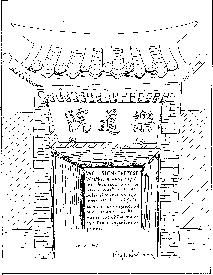
Well, we soon settled down to camp routine, and thirteen months have passed by like so many weeks. Included in the 1500 here there are 3/400 missionaries. About 14 nationalities are represented, and, as you can imagine, all kinds of people. What impresses us is the tremendous need of a mighty work of God amongst them. We are praying much for an outpouring of the Spirit. We are able to hold what religious meetings we want, so there are services held on Sundays and weekdays. The "evangelicals" have formed an "Evangelistic Band", and hold a special Gospel service each Sunday evening. We so far have seen very little definite fruit, but believe we shall see great things before we leave this place. We have held two CSSM campaigns - one for children 14 and over, and one for 13 and under. The Lord gave us souls in each of these, but we look for much greater things among the young. Numbers of us are realising the necessity of a new anointing with power in our own lives, and are seeking the Lord for this. One has a good many opportunities for personal dealings in one's medical work, but here again one is, up to this time, humbled before the Lord at the paucity of definite results.
It has been a great joy to have fellowship with numbers of choice people of God belonging to other missions. It has been a pleasure, too, to meet business folk from all over North China. May they not leave this camp without many coming to know Him Whom to know is life everlasting,
We, of course, hear nothing of war casualties. Some of you dear friends will likely have lost loved ones. May the Lord comfort you each one.
The life here naturally is not without its trials, but our experience confirms the Scripture affirmation that "They that seek the Lord shall not want any good thing." The family are at the present time well. David and Ivan do not thrive as they might, but enjoy moderate health. Baby Margaret is just walking and doing very well. Mrs. Howie and I keep healthy. We all send love, and pray that the Lord may bless and use you each one...
(P.S. 5th Sept 1945, How we praise the Lord for peace! I may now get this posted. We are not yet free, but have U.S.A, troops looking after us. We are receiving bountiful supplies of extra foods and clothing.)
***
Written Aboard R.M.S. "Tamaroa”, December, 1945.
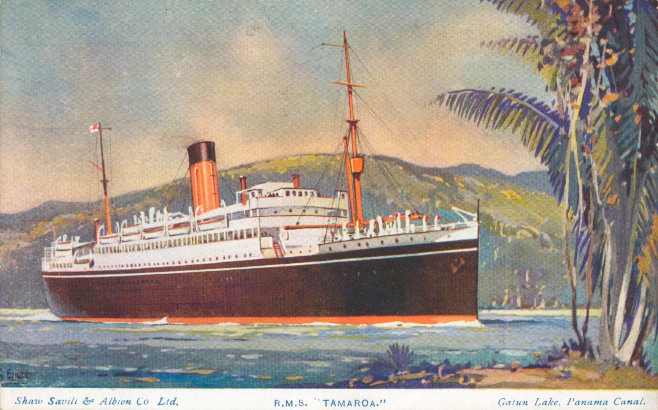
My dear Prayer-Partners,
I wonder if you received the letter I posted from Weihsien about the middle of September? I trust you did. Mails seem still very uncertain -
We ourselves have had no letter of any sort since long before peace came, although we were delighted to get a cable message from N.Z. in September. My news in last letter was mostly 1944, so let me follow on from there. In spite of somewhat restricted supplies, we had a very good Christmas. Kind gifts of nuts and sweets had been sent in from outside sources, and our camp kitchens excelled themselves in producing a dinner which included pork and apple sauce, and very good Christmas pudding, It was surprising, too, how the kiddies' stockings got filled up with quite nice gifts. David made me a shovel from a meat tin, and I made him a hammer from a piece of brass I found in the rubbish! We had a C.I.M. party in the evening and altogether it was a good day of rejoicing in the Lord.
At the end of January there was great joy and thanksgiving in the camp over the arrival of a large shipment of Red Cross parcels - sufficient to give a 50-lb, package to each person. What a wonderful sight it was as we opened the neat cardboard cartons -- tins of milk, butter, jam, coffee, chocolate, meats, raisins, sugar, etc. There was also a quantity of medicines, clothing, boots, etc. all of which were a wonderful gift from our Father Himself. For the next several months we fared well, the extra nourishment making a tremendous difference to the well-being of many, psychologically as well as physically.
In April the news that seeped in began to give us hopes of an early peace in Europe. Thereafter we had almost daily rumours that peace had come. Then on May 5th. we had news which seemed reliable, that Germany had collapsed. The camp in general took it quietly, but with a deep thankfulness to God. That night, though, a very amusing incident took place. About 11 p.m. (one hour after "lights out") two enterprising young men crept up a forbidden bell-tower and startled the camp by ringing a loud peal on the big bell. 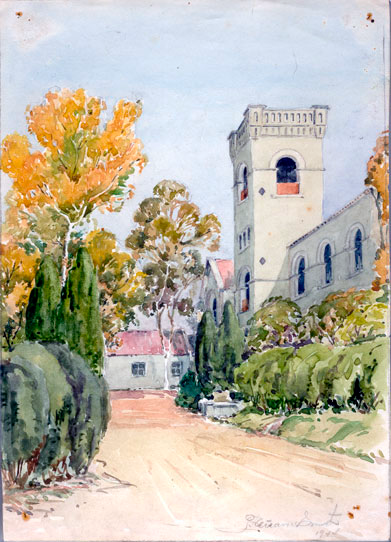 No one knew what it was all about, and the Japanese guards were at first much alarmed -- thinking there was a riot on -- and later, when they learned the truth, much annoyed. We afterwards heard that the ringing of this bell had been pre-arranged by the Japanese as an emergency signal to summon help from the city guards, two miles away, and this, of course, did not decrease, their annoyance, To "get even" with us they ordered a parade for roll-call about 1 a.m.! It was strenuous work getting everyone out, especially the kiddies, who were heavy with sleep, but it was not a cold night, and everyone felt it was thoroughly worth while, considering the greatness of the occasion!
No one knew what it was all about, and the Japanese guards were at first much alarmed -- thinking there was a riot on -- and later, when they learned the truth, much annoyed. We afterwards heard that the ringing of this bell had been pre-arranged by the Japanese as an emergency signal to summon help from the city guards, two miles away, and this, of course, did not decrease, their annoyance, To "get even" with us they ordered a parade for roll-call about 1 a.m.! It was strenuous work getting everyone out, especially the kiddies, who were heavy with sleep, but it was not a cold night, and everyone felt it was thoroughly worth while, considering the greatness of the occasion!
All this time we were much burdened for the lost in the camp. The work of the Evangelistic Band went on, with its regular meetings for prayer several times per week, and its Sunday evening evangelistic services. At times, too, there was great liberty in prayer, but the opposition of the enemy seemed intense, and only an odd soul was brought to the Lord through personal work. In early August an -Incident took place that I shall never forget. A young fellow of nineteen who had had experience of salvation about two years previously, had backslidden badly, and was really known throughout the camp as a rogue. He had not been coming near any of the services for a long time but one Sunday evening he came to our service. As he left afterwards, I felt led to speak to him, and we had quite a long talk. He acknowledged his backslidden condition, and seemed to have a desire to come back to the Lord, but wanted to delay until he had put certain things right with the folk he had wronged. I urged him not to put off his dealings with God, but to confess and get right with Him first. This he did before we parted, and he called the next day at noon for prayer. He seemed very happy, and said he had the assurance of his acceptance with the Lord. About 4 p.m. the same day while helping to get some dead branches from a tree for fuel, he fell thirty feet and was dreadfully injured - skull, spine and forearm all fractured - and he passed away at midnight. This created a solemn impression through the camp, and I was asked to recount the incident at the following Sunday evenings service. Much prayer was concentrated upon this, and, using the two texts “God who is rich 'in mercy…” and “Today if ye will hear His voice”, I told of the Lord's mercy towards the youth and urged the unsaved to accept Christ without delay. The leader of the service held an after-meeting, where, four young people and one adult confessed Him, and later a second adult did the same.
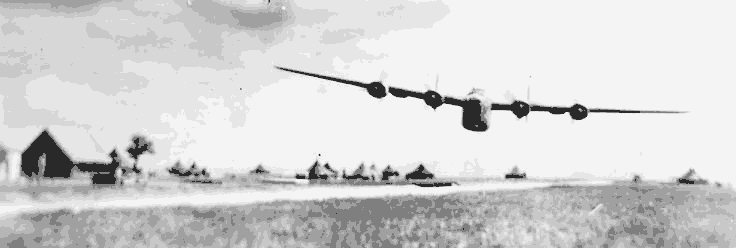
The next great event was Japan's surrender, word of which reached us on the 15th august. Even this stupendous news was received comparatively quietly - mainly because we had heard so many false rumours in the past, that we hardly dared to believe that this was true! It more and more became evident that it was true, however, and. how we praised, God! Then, on the morning of the 17th, a huge U.S. "Flying Fortress" flew over the camp, and, before we knew what was happening, had dropped seven live parachutists just outside the walls! Oh, the excitement! The crowd of internees just ignored the Japanese guards and swarmed outside the gates to welcome them. From that time on things were altogether different for us. Very soon our American succourers had installed radios to give us the world's news, and established a reading room to "orientate" us with regard to past events. Right up to the date of our departure five weeks later however, the Japanese continued nominally in control. Kind Chinese from surrounding parts commenced to send in most generous gifts of eggs, fruit, etc. and to call to enquire after our welfare.
On the 27th we had another most exciting time when for four hours, about twelve U.S. planes flew back and forth dropping shower after shower of supplies by parachute. 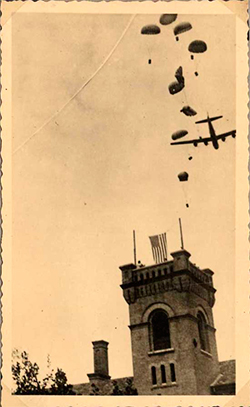 It took all day to gather them in, and, from then on, what with tinned meats, fruits, chocolate, etc. we lived in utter luxury! Marvellous quantities of clothing also were included, and, by the time the internees had donned the U.S. military issues, it looked as though an American army had suddenly sprung up in our midst!
It took all day to gather them in, and, from then on, what with tinned meats, fruits, chocolate, etc. we lived in utter luxury! Marvellous quantities of clothing also were included, and, by the time the internees had donned the U.S. military issues, it looked as though an American army had suddenly sprung up in our midst!
On 10th September came the long-looked-for order to pack up, and on the 25th, the first large party of 580, comprising those going overseas (including ourselves) left the camp. It was indeed a memorable day, with lovely weather, and everything admirably organised by the U.S. Army officials in conjunction with our own camp committee. We were taken in trucks to the station where a special train waited to carry us to the port of Tsingtao, 4 hours' journey away. Cheering, flag-waving crowds of Chinese greeted us at every point along the way, whilst the reception at Tsingtao was just overwhelming. Imagine the thrill given by the sight of a platform guarded by real live British bluejackets, with groups of British and American officers, a Chinese delegation of welcome, and a Royal Marines Band playing "Colonel Bogey".
We were quartered in a large modern hotel on the seashore, taken over in full running order from the Japanese, where, under the kindly care of the American Army authorities, we just lay back and enjoyed leisure end luxury for twelve days. Here we met some of our C.I.M. German Associate members who have been living in Tsingtao during the war; and with whom we enjoyed most happy fellowship. They had from time to time sent us "comfort parcels" into camp as they were able, and hence had proved themselves real friends in need.
On October 7th we embarked on the U.S. "Attack Transport" Geneva for Hongkong.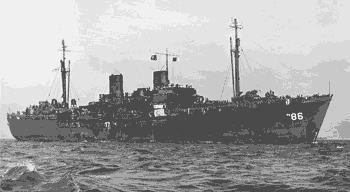 We were rather tightly packed, and had a very rough trip on the outskirts of a severe typhoon, but after five days reached our destination, and were delighted to be in British territory again and in the midst of so much Royal Navy and R.A.F. activity. Here our American benefactors, who had done so much for us, handed us over to the British R.A.P.W.I. authorities. The evening before we disembarked, a number of us had a most happy meeting with two keen Christians of the "Geneva's" crew, with whom we enjoyed fellowship in song and testimony.
Hongkong with its lovely autumn weather and green mountain scenery was a real tonic to us. We were quartered in modern flats in Kowloon and were shown most kind attention by the British authorities and by the Australian Red Cross. We expected to be there only a few days, but our stay extended to over a month -- thus incidentally shattering our hopes of being in England for Christmas. While there, we met some warm Christians from the forces, and enjoyed fellowship with them. One had numbers of opportunities of speaking to servicemen of the things of God, and it was a joy to see several enter into Life. We also had happy fellowship with a Japanese pastor who had acted as liaison officer between the Japanese army and our Prisoners of War, and who had shown much kindness to our people. Because of this, he has not been interned, as have the rest of the Japanese there, and is now using his liberty to do Gospel work among his interned countrymen, of whom there are thousands.
We were rather tightly packed, and had a very rough trip on the outskirts of a severe typhoon, but after five days reached our destination, and were delighted to be in British territory again and in the midst of so much Royal Navy and R.A.F. activity. Here our American benefactors, who had done so much for us, handed us over to the British R.A.P.W.I. authorities. The evening before we disembarked, a number of us had a most happy meeting with two keen Christians of the "Geneva's" crew, with whom we enjoyed fellowship in song and testimony.
Hongkong with its lovely autumn weather and green mountain scenery was a real tonic to us. We were quartered in modern flats in Kowloon and were shown most kind attention by the British authorities and by the Australian Red Cross. We expected to be there only a few days, but our stay extended to over a month -- thus incidentally shattering our hopes of being in England for Christmas. While there, we met some warm Christians from the forces, and enjoyed fellowship with them. One had numbers of opportunities of speaking to servicemen of the things of God, and it was a joy to see several enter into Life. We also had happy fellowship with a Japanese pastor who had acted as liaison officer between the Japanese army and our Prisoners of War, and who had shown much kindness to our people. Because of this, he has not been interned, as have the rest of the Japanese there, and is now using his liberty to do Gospel work among his interned countrymen, of whom there are thousands.
I fear my letter is getting too long! Let me quickly bring my news up to date. We are now aboard R.M. S. "Tamaroa", having left Hongkong on 17th Nov., calling at Shanghai on the 21st, Singapore on the 30th and Colombo on 6th Dec. Our ship is at present in the Gulf of Aden, and we expect (D.V.) to reach Liverpool about the 29th. As you probably know, my wife's parents are in England, and I am looking forward to visiting the Homeland. After some months there we hope, if the Lord will, to come and visit you all in New Zealand. All five of us are well. David is aged 7, Ivan 4½ and Margaret 2½. The kiddies are fast friends with the servicemen on board, to whom no doubt, they are a touch of home.
Thank you indeed, each and every one, for your prayers all these years. "My God shall supply all your need, according to His riches in glory by Christ Jesus" - He has fulfilled His promise to the utmost and we praise Him accordingly. May He cause His face to shine upon each one of you.
***
And now, before this "goes to press", let me add a stop-press item. The expected newcomer arrived on 30th December, and we have given her the name “Kathryn Mary". All went so happily and well that we know the Lord heard our prayers. May she be always and wholly His! We now expect to go south in February.
With warmest greetings, I remain,
Yours very sincerely in Christ,
A. HALLAM HOWIE.
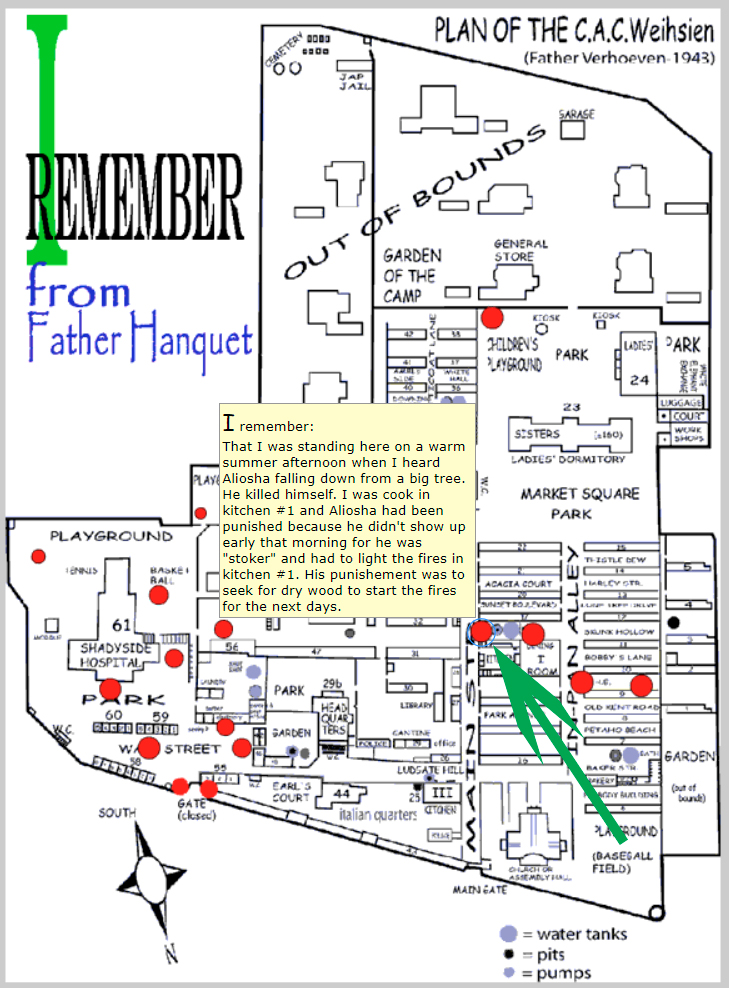
 No one knew what it was all about, and the Japanese guards were at first much alarmed -- thinking there was a riot on -- and later, when they learned the truth, much annoyed. We afterwards heard that the ringing of this bell had been pre-arranged by the Japanese as an emergency signal to summon help from the city guards, two miles away, and this, of course, did not decrease, their annoyance, To "get even" with us they ordered a parade for roll-call about 1 a.m.! It was strenuous work getting everyone out, especially the kiddies, who were heavy with sleep, but it was not a cold night, and everyone felt it was thoroughly worth while, considering the greatness of the occasion!
No one knew what it was all about, and the Japanese guards were at first much alarmed -- thinking there was a riot on -- and later, when they learned the truth, much annoyed. We afterwards heard that the ringing of this bell had been pre-arranged by the Japanese as an emergency signal to summon help from the city guards, two miles away, and this, of course, did not decrease, their annoyance, To "get even" with us they ordered a parade for roll-call about 1 a.m.! It was strenuous work getting everyone out, especially the kiddies, who were heavy with sleep, but it was not a cold night, and everyone felt it was thoroughly worth while, considering the greatness of the occasion!


 It took all day to gather them in, and, from then on, what with tinned meats, fruits, chocolate, etc. we lived in utter luxury! Marvellous quantities of clothing also were included, and, by the time the internees had donned the U.S. military issues, it looked as though an American army had suddenly sprung up in our midst!
It took all day to gather them in, and, from then on, what with tinned meats, fruits, chocolate, etc. we lived in utter luxury! Marvellous quantities of clothing also were included, and, by the time the internees had donned the U.S. military issues, it looked as though an American army had suddenly sprung up in our midst! We were rather tightly packed, and had a very rough trip on the outskirts of a severe typhoon, but after five days reached our destination, and were delighted to be in British territory again and in the midst of so much Royal Navy and R.A.F. activity. Here our American benefactors, who had done so much for us, handed us over to the British R.A.P.W.I. authorities. The evening before we disembarked, a number of us had a most happy meeting with two keen Christians of the "Geneva's" crew, with whom we enjoyed fellowship in song and testimony.
Hongkong with its lovely autumn weather and green mountain scenery was a real tonic to us. We were quartered in modern flats in Kowloon and were shown most kind attention by the British authorities and by the Australian Red Cross. We expected to be there only a few days, but our stay extended to over a month -- thus incidentally shattering our hopes of being in England for Christmas. While there, we met some warm Christians from the forces, and enjoyed fellowship with them. One had numbers of opportunities of speaking to servicemen of the things of God, and it was a joy to see several enter into Life. We also had happy fellowship with a Japanese pastor who had acted as liaison officer between the Japanese army and our Prisoners of War, and who had shown much kindness to our people. Because of this, he has not been interned, as have the rest of the Japanese there, and is now using his liberty to do Gospel work among his interned countrymen, of whom there are thousands.
We were rather tightly packed, and had a very rough trip on the outskirts of a severe typhoon, but after five days reached our destination, and were delighted to be in British territory again and in the midst of so much Royal Navy and R.A.F. activity. Here our American benefactors, who had done so much for us, handed us over to the British R.A.P.W.I. authorities. The evening before we disembarked, a number of us had a most happy meeting with two keen Christians of the "Geneva's" crew, with whom we enjoyed fellowship in song and testimony.
Hongkong with its lovely autumn weather and green mountain scenery was a real tonic to us. We were quartered in modern flats in Kowloon and were shown most kind attention by the British authorities and by the Australian Red Cross. We expected to be there only a few days, but our stay extended to over a month -- thus incidentally shattering our hopes of being in England for Christmas. While there, we met some warm Christians from the forces, and enjoyed fellowship with them. One had numbers of opportunities of speaking to servicemen of the things of God, and it was a joy to see several enter into Life. We also had happy fellowship with a Japanese pastor who had acted as liaison officer between the Japanese army and our Prisoners of War, and who had shown much kindness to our people. Because of this, he has not been interned, as have the rest of the Japanese there, and is now using his liberty to do Gospel work among his interned countrymen, of whom there are thousands.